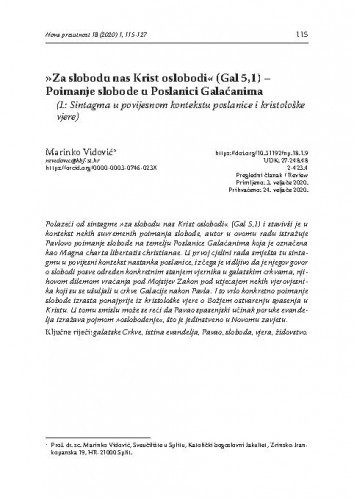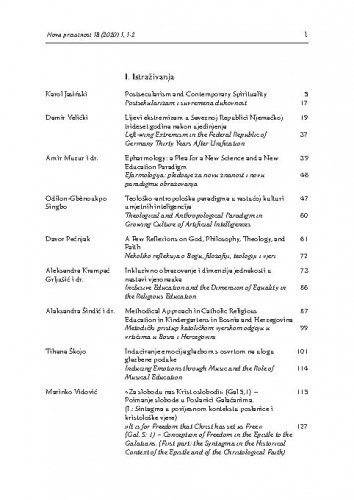Polazeći od sintagme »za slobodu nas Krist oslobodi« (Gal 5,1) i stavivši je u kontekst nekih suvremenih poimanja slobode, autor u ovomu radu istražuje Pavlovo poimanje slobode na temelju Poslanice Galaćanima koja je označena kao Magna charta libertatis christianae. U prvoj cjelini rada smješta tu sintagmu u povijesni kontekst nastanka poslanice, iz čega je vidljivo da je njegov govor o slobodi posve određen konkretnim stanjem vjernika u galatskim crkvama, njihovom dilemom vraćanja pod Mojsijev Zakon pod utjecajem nekih vjerovjesnika koji su se ušuljali u crkve Galacije nakon Pavla. I to vrlo konkretno poimanje slobode izrasta ponajprije iz kristološke vjere o Božjem ostvarenju spasenja u Kristu. U tomu smislu može se reći da Pavao spasenjski učinak poruke evanđelja izražava pojmom »oslobođenje«, što je jedinstveno u Novomu zavjetu.; Starting from the syntagma »It is for freedom that Christ has set us free« (Gal. 5: 1) and putting it in the context of some contemporary ideas of freedom, in this paper the author explores Paul’s idea of freedom on the basis of the Epistle to the Galatians, which is designated as Magna Charta Libertatis Christianae. In the first part of the paper he places this syntagma in the historical context of the origin of the Epistle, from which it is evident that his speech on freedom is entirely determined by the specific state of believers in Galatian Churches, by their dilemma of returning to the Law of Moses under the influence of some heralds of faith who sneaked into the Churches of Galatia after Paul. And this very concrete idea of freedom springs up first of all from the Christological faith about God’s realization of salvation in Christ. In this sense, it can be said that Paul expresses the salvific effect of the gospel message by the term «liberation», which is unique in the New Testament.
Sažetak

 Nova prisutnost : časopis za intelektualna i duhovna pitanja : 18, 1(2020) / glavna i odgovorna urednica, editor-in-chief Katica Knezović.
Nova prisutnost : časopis za intelektualna i duhovna pitanja : 18, 1(2020) / glavna i odgovorna urednica, editor-in-chief Katica Knezović.